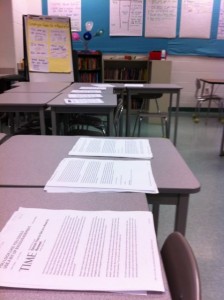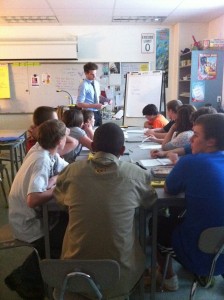When my coworker, Lynn, sent me this piece of writing, I knew I had to share it with you. She is truly ahappyteacher, but this morning she was also ahappywriter. Nothing makes me happier than passionate people, passionate people writing—they’re my BFFs.
Anyway, she wrote this as a model for her students, to show effective organization. I’m pretty sure it also shows effective voice, style, and everything good writing should be. I love Lynn for sharing like this with her kids; I love Lynn for sharing this with me; I’m sure you’ll love her too. . . .
“The Power of Words”
I wasn’t the prettiest, smartest, or most popular person in my class. But like any normal kid, I wanted to get attention from my peers and teachers. Fortunately, I found a way that was positive: humor. And no where did that humor come out more than through my writing. I evolved as a writer from the kindergartner who gripped a pencil tightly with her tongue sticking out as she carefully formed each letter to the teacher who still hunts and pecks as she types a mentor text for her eighth grade students.
Picture this: a five year old with a bad hair cut from her grandfather (it was a way for a single income family to save a few bucks) and pink cat eye classes (hey, it was 1963; I was stylin’). Eager to start school and impress the teacher, I proudly printed my first name at the top of my paper. L nn. Miss McGregor walked by, glancing at my paper as I smiled up at her, despite the stern look she gave me (as the year progressed, those stern looks turned into vicious slaps meant to stifle my chattiness and humorous remarks which I never raised my hand for). She made no comment, but later that day I got to take a note home to my mom. My school career had just started; what did I know about notes home from the teacher. Later that night, my mom informed me that she couldn’t practice my letters and name with me anymore. The teacher said I wasn’t making my letters correctly, specifically the “y”, and the school had a particular way that they wanted to teach students how to write. These were different times from today, a time when both students and parents deferred to teachers’ wisdom (and discipline), so my mom dutifully allowed the school to teach me how to write letters properly. And while writing is much more than knowing how to write your name, my earliest memories of writing are about writing my name, my identity, backwards “Y” and all. Fortunately, Mrs. McGregor did not smack the joy of learning out of me, nor did she quell my witty remarks, which amused the class. I loved elementary school, especially reading and writing which came quite easily to me, and I readily accepted the role as class clown.
My writing flourished, however, when I hit middle and high school. By now I was experimenting with the actual spelling of my name, ranging from the typical “Lyn” or “Lynne” to the more unique “Lyne” which was short-lived because people began calling me “Line”. But the real power of writing for me came with the status it gave me as a funny person, a natural born storyteller. Quite a few teaches allowed us to perform skits to show our knowledge, whether it was reenacting Columbus’s discovery of America in social studies or creating a different ending to a novel we’d read in English class. And here is where I finally got to shine. I was the writer of the script. Naturally, I had a star role in the production too, and no matter how serious the topic, I always managed to work some humor into it. At that time I didn’t own a type writer, but I didn’t mind filling sheet after sheet with blue ball point pen, crossing out a word here to put in a more precise one, inserting a comma there, and sometimes even ripping up the whole paper to start over. Like most adolescents, I was painfully aware of my appearance (my stylin’ pink eye glasses now replaced by the much more hip octagon wire frames of the 70’s) and while I was limited in my ability to perfect my appearance, I was empowered with the written word, which I used to express myself and to entertain others.
By now I realized that my status in school was someone who was smart, but not too smart, and funny. While I never ran with the most popular people, I was accepted by them because I could make them laugh. In 11th and 12th grades I had the same English teacher, Mrs. Watkins, and under her tutelage I created literary analyses, research papers, and my personal favorite: narratives. Stories about me and my life experiences which I could embellish and make funny. What’s more, she let me read them aloud to the class (I always volunteered), and I can still picture it: me at a desk with the chair attached which was in the very front of the room, the blackboard behind me with Mrs. Watkin’s perfect handwriting conveying profound words of wisdom, and the whole classes’ eyes on me as I read my story. Not that I wanted anyone looking at me too closely back then (I never felt like I had quite the right look or clothes or hair and by now my eyes were so bad that no matter what kind of cool glasses I tried on, by the time my prescription was put into them, I looked like I was wearing the classic geek Coke bottles, definitely not a way to get a boyfriend). However, the real draw of the classes’ focus on me was the power of my written words on an audience. Maybe Richard wasn’t going to go to the Homecoming dance with me (my fantasy), but I could make him laugh, and that kind of attention drove me to write more and more. Poetry (most of it really bad) and letters to friends when I went off to college (long before email and texting), and eventually lesson plans as a student teacher for 7th grade English.
Because now writing was not just a way for me to be the center of attention as I made people laugh. It was something I was good at, whether I wrote to entertain, inform, or persuade. I chose a career to teach others how to read and write because I loved doing both these things so much, that I wanted to inspire others to love them too (or at least appreciate what the written word has to offer). And so here I sit, hunting and pecking on my keyboard, writing a mentor text for my 8th grade students, feeling the power of the written words as they seem to almost magically appear on the page (wearing both contacts and funky reading glasses now that my myopic eyes are middle aged). When I share this written piece with them, in hopes of inspiring them to think about how they have progressed, evolved, and grown in their own lives, I also hope that they appreciate the power of the written word. And maybe even laugh a few times.



